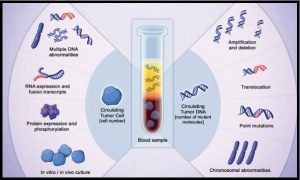SUMMARY: Colorectal Cancer (CRC) is the third leading cause of cancer-related deaths in men and women in the United States. The American Cancer Society estimates that approximately 149,500 new cases of CRC will be diagnosed in the United States in 2021 and about 52,980 patients will die of the disease. The lifetime risk of developing CRC is about 1 in 23.
Cell-free DNA (cfDNA) refers to DNA molecules that circulate in the bloodstream after cell apoptosis or necrosis. A specific portion of cfDNA that originates from tumor cells is referred to as circulating tumor DNA (ctDNA), which can be detected in the cell-free component of peripheral blood samples in almost all patients with advanced solid tumors, including advanced colorectal cancer. ctDNA is a valuable biomarker and allows early detection of relapse.
Patients with metastatic colorectal cancer are often treated with chemotherapy and sometimes surgical intervention. Treatment decisions are based on clinical and pathological characteristics such as tumor size and number of metastatic lesions, which is an arbitrary method of treatment stratification. ctDNA can be a potential biomarker of tumor biology and disease trajectory, and can be an important clinical decision tool. The present study was conducted to systematically review ctDNA in Stage IV colorectal cancer, and assess its potential role as a prospective biomarker, to guide treatment decisions.
This meta-analysis included 2823 patients from 28 studies. ctDNA was detectable in 80-90% of patients with metastatic CRC prior to treatment. This analysis found a strong correlation between detectable ctDNA after treatment with surgery or chemotherapy and Overall Survival (HR=2.2; P<0.00001), as well as Progression Free Survival (HR= 3.15; P<0.00001). Further, ctDNA as an early biomarker was able to consistently predict long term prognosis in patients with unresectable disease, with changes after one cycle of systemic therapy demonstrating prognostic value. In patients with surgically resectable disease treated with curative intent, detection of ctDNA offered a lead time of 10 months, over radiological recurrence.
The authors concluded from this analysis that ctDNA is detectable in the majority of resectable and unresectable patients with metastatic colorectal cancer, and the presence of ctDNA is clearly associated with shorter Overall Survival. ctDNA may serve as an early biomarker and dynamic assessment of ctDNA may predict treatment efficacy.
Circulating tumour DNA as a biomarker in resectable and irresectable stage IV colorectal cancer; a systematic review and meta-analysis. Jones RP, Pugh SA, Graham J, et al. Eur J Cancer. 2021 Feb;144:368-381. doi: 10.1016/j.ejca.2020.11.025. Epub 2021 Jan 7.

